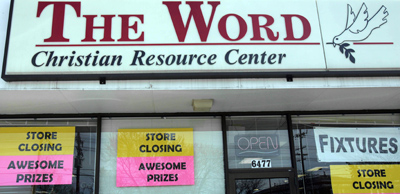
(RNS) The Word Christian Resource Center in Parma Heights, Ohio, closed in 2007 after it couldn’t keep up with online sales and big-box retailers. Christian retailers are now asking the Justice Department to investigate price-fixing at Wal-Mart, Target and Amazon.com. Religion News Service photo by Roadell Hickman/The Plain Dealer of Cleveland.
(RNS) The saying goes that when God closes a door, he opens a window.
So when the Borders bookstore chain — the nation’s second-largest — finishes closing all of its stores this month, Christian retailers see a window of opportunity in the death of a mega-competitor that once threatened to put them out of business.
With 70 percent of Christian retailers reporting flat or declining sales last year, and overall sales dropping 3 percent according to the Christian retail association CBA, proactive Christian booksellers, marketing agencies and the 1,200-member CBA are taking any opportunities they can.
After Borders announced its liquidation in July, Colorado Springs, Colo.-based CBA sent an alert to member stores: “Post Borders Growth Strategy: As Borders Shuts its Doors, Christian Booksellers Should Open Theirs Wider.”
“Today, Borders is irrelevant in the world of bookselling,” the document states. “If we do not adapt to the changing marketplace and new technologies, our influence will diminish or disappear altogether.”
The letter offers suggestions for retailers including discounts for customers with Borders loyalty cards and trying to lure former Borders customers into Christian stores.
“It is always sad when a bookstore that makes Christian materials available to the public can no longer do that,” said Curtis Riskey, CBA executive director. “However, the chain’s demise does create more opportunities for independent local Christian stores to fill the gap.”
Last month, the Munce Group, an agency in Indian Rocks Beach, Fla., that provides marketing and business solutions for 498 independently owned Christian bookstores, analyzed where the remaining Borders stores were located against a map of Munce-affiliated stores in those markets.
“We sent (the analysis) to all the Christian publishers we deal with and reminded them there were stores still in these markets, and it was a great time to send an encouraging word or send a sales representative in,” said company president Kirk Blank.
It wasn’t the first time Munce spotted an opening — the company executed a similar strategy last February when Borders filed for bankruptcy and announced it would close about 30 percent of its stores. According to Munce, their retailers saw a slight uptick in foot traffic.
Blank said additional marketing materials will be available for stores trying to capitalize on Borders closings, and some stores matched Borders’ everything-must-go sales with their own sales.
The Parable Group in San Luis Obispo, Calif., which provides marketing for 109 Christian retailers, including 40 Parable franchise stores, is doing more online advertising to attract new customers while Borders liquidates, said CEO Steve Potratz. Some stores are offering more gifts, and by year’s end, e-books to accommodate demand.
Christian retailers have experienced immense upheaval the past seven or eight years competing with Amazon, e-books and big box retailers like Walmart and Costco, said Andy Butcher, editor for Christian Retailing magazine in Lake Mary, Fla. One advantage that can help them stay alive is serving a niche audience that shares the same passionate beliefs.
“We know where most of our customers are on Sunday morning,” Potratz said. “The opportunity to work with a church, and partner with a church, is critical, and I am seeing more and more of our stores looking for and gaining opportunity to help and resource the church.”
While some observers may find it distasteful to find business opportunities at the expense of a retail chain’s demise, Butcher said he doesn’t see the CBA’s or Munce’s efforts as predatory.
“At the end of the day they’re looking to serve people with Christian resources,” Butcher said. “I don’t think they are so much rubbing their hands as far as holding their hands out.”




